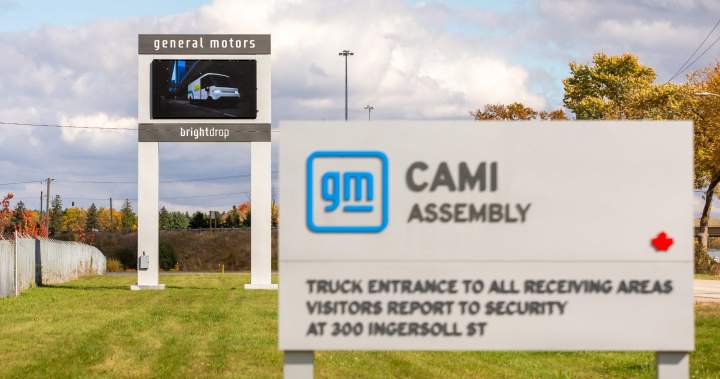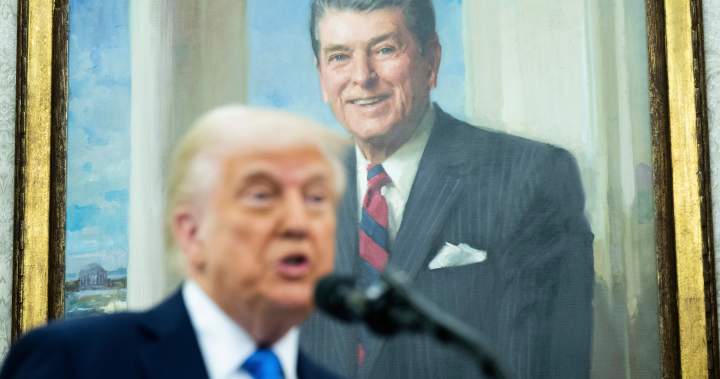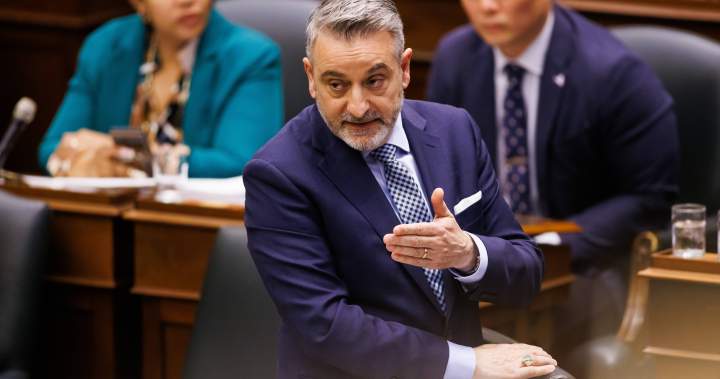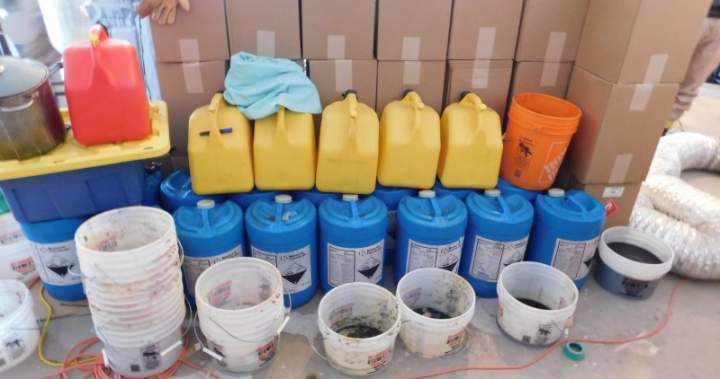Joly gives GM 15 days to detail ‘next steps’ for workers at Ontario plant

Industry Minister Melanie Joly says she has given General Motors 15 days to deliver a full update on its “next steps” for workers at its plant in Ingersoll, Ont., after ending production there earlier this week.
“Canadian workers deserve clarity and action, not uncertainty,” Joly said in a brief social media statement after meeting with representatives from GM, Unifor and the Ontario government Thursday.
Separately, a government source told Global News that Ottawa will limit the number of vehicles GM and Stellantis can import tariff-free from the United States to sell in Canada.
The move, which was first reported by CBC News Thursday evening, comes after the government vowed to hold both companies accountable for threatening auto manufacturing jobs in Canada by shutting down production at two plants in Ontario.
General Motors said Tuesday that the decision to end production of the BrightDrop electric delivery van at its CAMI plant was demand-related, and it wasn’t moving production elsewhere.
The company had already temporarily cut production in April before fully idling the plant in May, leaving more than 1,200 unionized workers temporarily laid off. The plant was supposed to restart operations in November with a single shift that would have meant around half that number heading back to work.

Get daily National news
Get the day’s top news, political, economic, and current affairs headlines, delivered to your inbox once a day.
Joly said she was putting together a “response group” with the goal of bringing a new model to be produced at the plant.
GM’s announcement came less than a week after Stellantis said it was moving production of its Jeep Compass from its plant in Brampton, Ont., to Illinois, as part of a surge of investment to the U.S.

Joly has said the government was considering all its options, “including legal,” to hold the company accountable for the move. She has suggested Stellantis broke promises to protect Canadian jobs and investment in exchange for billions of dollars in federal subsidies.
Conservatives have sought to find out if the contracts signed between Stellantis and Ottawa included “guarantees” for Canadian autoworkers.
The federal government in April said companies that continue to manufacture vehicles in Canada will get an exemption from Ottawa’s retaliatory tariffs in response to U.S. President Donald Trump’s auto tariffs.
Ottawa’s move to limit those tariff-free imports for GM and Stellantis means they will no longer be eligible for that exemption.
Trump has said his tariffs are intended to drive auto manufacturing back to the United States, and his administration wants future North American supply chains to prioritize American production.
During a meeting with Prime Minister Mark Carney at the White House early this month, Trump said the two sides were working on “formulas” for auto production and supply that Carney said would ensure both countries’ industries remain both collaborative and competitive.
Auto manufacturing is also expected to take centre stage during next July’s review of the Canada-U.S.-Mexico Agreement on free trade.
More to come…
© 2025 Global News, a division of Corus Entertainment Inc.



In a late-night social media post, U.S. President Donald Trump said he is terminating all trade talks with Canada over a television ad against tariffs.
In his Truth Social post, Trump blamed an “egregious” television ad paid for and run by the Ontario government on American television networks.
The ad, featuring images of Americans from all walks of life going about their days over swelling music, is set to several clips from a 1987 radio address by former U.S. president Ronald Reagan.
In the speech, Reagan spoke about “free and fair trade,” and about how he views the risks of tariffs and protectionism against tariffs the U.S. was imposing at the time on Japanese goods.
The speech in its entirety lasted roughly five minutes, while the Ontario ad lasted one minute, running different excerpts of Reagan’s longer speech together.

What Reagan quotes did Ontario use?
Here is the transcript of the advertisement Ontario has been running, using quotes from Reagan’s longer speech.
“When someone says, let’s impose tariffs on foreign imports, it looks like they’re doing the patriotic thing by protecting American products and jobs. And sometimes for a short while it works, but only for a short time.
But over the long run, such trade barriers hurt every American worker and consumer. High tariffs inevitably lead to retaliation by foreign countries and the triggering of fierce trade wars.
Then the worst happens.
Markets shrink and collapse, businesses and industries shut down, and millions of people lose their jobs.
Throughout the world, there’s a growing realization that the way to prosperity for all nations is rejecting protectionist legislation and promoting fair and free competition. America’s jobs and growth are at stake.”
What did the full Reagan speech say?
Reagan’s full speech in 1987 lasted for five minutes:
“My fellow Americans, Prime Minister Nakasone of Japan will be visiting me here at the White House next week. It’s an important visit because while I expect to take up our relations with our good friend Japan, which overall remain excellent, recent disagreements between our two countries on the issue of trade will also be high on our agenda.

Get breaking National news
For news impacting Canada and around the world, sign up for breaking news alerts delivered directly to you when they happen.
As perhaps you’ve heard, last week I placed new duties on some Japanese products in response to Japan’s inability to enforce their trade agreement with us on electronic devices called semiconductors.
Now, imposing such tariffs or trade barriers and restrictions of any kind are steps that I am loath to take. And in a moment I’ll mention the sound economic reasons for this, but over the long run such trade barriers hurt every American worker and consumer.
But the Japanese semiconductors were a special case. We had clear evidence that Japanese companies were engaging in unfair trade practices that violated an agreement between Japan and the United States.
We expect our trading partners to live up to their agreements. As I’ve often said, our commitment to free trade is also a commitment to fair trade. But you know, in imposing these tariffs, we were just trying to deal with a particular problem, not begin a trade war.
So next week, I’ll be giving Prime Minister Nakasone this same message. We want to continue to work cooperatively on trade problems and want very much to lift these trade restrictions as soon as evidence permits. We want to do this because we feel both Japan and the United States have an obligation to promote the prosperity and economic development that only free trade can bring.
Now that message of free trade is one I conveyed to Canada’s leaders a few weeks ago, and it was warmly received there.
Indeed, throughout the world, there’s a growing realization that the way to prosperity for all nations is rejecting protectionist legislation and promoting fair and free competition.
Now there are sound historical reasons for this. For those of us who live through the Great Depression, the memory of the suffering it caused is deep and searing. And today, many economic analysts and historians argue that high tariff legislation passed back in that period called the Smoot Hawley Tariff, greatly deepened the depression and prevented economic recovery.
You see, at first, when someone says, let’s impose tariffs on foreign imports, it looks like they’re doing the patriotic thing by protecting American products and jobs. And sometimes for a short while it works, but only for a short time.
What eventually occurs is first homegrown industries start relying on government protection in the form of high tariffs. They stop competing and stop making the innovative management and technological changes they need to succeed in world markets.
And then while all this is going on, something even worse occurs.
High tariffs inevitably lead to retaliation by foreign countries and the triggering of fierce trade wars. The result is more and more tariffs, higher and higher trade barriers and less and less competition.
So soon, because of the prices made artificially high by tariffs that subsidize inefficiency and poor management, people stop buying.
Then the worst happens.
Markets shrink and collapse, businesses and industry shut down, and millions of people lose their jobs.
The memory of all this occurring back in the 30s made me determined when I came to Washington to spare the American people the protectionist legislation that destroys prosperity.
Now, it hasn’t always been easy. There are those in the Congress just as there were back in the 30s, who want to go for the quick political advantage, who risk America’s prosperity for the sake of a short-term appeal to some special interest group who forget that more than five million American jobs are directly tied to the foreign export business and additional millions are tied to imports.
Well, I’ve never forgotten those jobs, and on trade issues, by and large, we’ve done well. In certain select cases, like the Japanese semiconductors, we’ve taken steps to stop unfair practices against American products, but we’ve still maintained our basic long-term commitment to free trade and economic growth.
So, with my meeting with Prime Minister Nakasone and the Venice Economic Summit coming up, it’s terribly important not to restrict a president’s options in such trade dealings with foreign governments.
Unfortunately, some in the Congress are trying to do exactly that. I’ll keep you informed on this dangerous legislation because it’s just another form of protectionism, and I may need your help to stop it. Remember, America’s jobs and growth are at stake. Until next week, thanks for listening and God bless you.

Earlier Thursday night, the Ronald Reagan Presidential Foundation and Institute posted on X that an ad created by the government of Ontario “misrepresents the ‘Presidential Radio Address to the Nation on Free and Fair Trade’ dated April 25, 1987.”
It added that Ontario did not receive foundation permission “to use and edit the remarks.”
The foundation said it is “reviewing legal options in this matter” and invited the public to watch the unedited video of Reagan’s address.
For more on how Canadian leaders are responding, read the latest here.
— With files from The Associated Press

An Ontario school trustee who the province’s education minister sought to fire through legislation has now resigned.
Mark Watson was one of four trustees with the Brant Haldimand Norfolk Catholic District School Board who took a $45,000 trip to Italy to buy $100,000 worth of art for the board.

Get breaking National news
For news impacting Canada and around the world, sign up for breaking news alerts delivered directly to you when they happen.
The controversial trip is one of several examples of what Ontario Education Minister Paul Calandra has cited as evidence of misuse of public dollars at some school boards and a need for a governance overhaul.
Three of the four trustees repaid their trip expenses, but Calandra has said Watson refused to pay his share back in full and still owes more than $12,000.
Calandra tabled a bill Monday with the sole purpose of firing Watson and barring him from being a trustee at any Ontario school board until 2030.
Watson has not responded to a request for comment, but on Friday the board said he had resigned.
© 2025 The Canadian Press

A massive synthetic drug lab in Ontario has been dismantled following a months-long RCMP investigation that led to three arrests and the seizure of millions of dollars’ worth of illegal drugs, chemicals and equipment.
Police say the operation, known as Project Overboil, began when officers noticed suspicious chemical purchases linked to a company called Oquin Industries.
The investigation uncovered a sophisticated clandestine laboratory hidden on a large rural property in Schomberg, Ont., along with a second storage site in Port Colborne.
The bust, which was carried out in early Sept., revealed a fully operating synthetic drug lab with thousands of litres of hazardous waste and materials that took 10 days to neutralize on site.
“The arrest of three individuals and the seizure of numerous items represent a significant disruption to the illegal drug trade in Canada,” Supt. Jonathan Ko, officer in charge of the Central Region Organized Crime, said during a press conference Friday morning.
RCMP teams executed search warrants on Sept 7, 2025, seizing approximately 239 kilograms of finished product, including MDMA, GHB and methamphetamines, along with $8,000 in cash, a range of precursor chemicals such as acetone, methanol and hydrochloric acid, and industrial drug-making equipment, including pill presses and rotary evaporators.

Get daily National news
Get the day’s top news, political, economic, and current affairs headlines, delivered to your inbox once a day.
Two firearms and prohibited magazines were also recovered.
The suspects, identified by RCMP as Christopher O’Quinn, Liang Gao and Katie King, face a combined 33 charges related to drug production, trafficking and firearms offences.
Police said O’Quinn has a previous criminal record, while the other two do not.
He added that authorities were tipped off after the company stopped buying those chemicals for three years, and then suddenly started again, which made investigators suspicious.
The purchased chemicals are known to be used in the production of many street drugs like fentanyl, MDMA, methamphetamines and other chemo-synthetic drugs.
Chief Supt. Chris Leather added that the significance of the operation goes far beyond the value of the seized substances.
“While it involved the seizure of millions of dollars’ worth of suspected controlled substances and cash, the true importance lies in the fact that we removed a synthetic drug lab and neutralized thousands of litres of hazardous waste,” Lather said.
“We prevented the future production of millions of dollars’ worth of synthetic drugs and averted a potentially dangerous public safety incident posed by the unsafe storage of dangerous chemicals.”
He added that the case reflects “a growing national trend, the rise of synthetic opioid production within Canada.”
Since Jan. 1, 2024, the RCMP have dismantled a total of 50 clandestine drug laboratories.
© 2025 Global News, a division of Corus Entertainment Inc.
-

 Uncategorized4 months ago
Uncategorized4 months agoShop Proud, Eat Proud, Be Proud — Ottawa Canada Day Market This June 28th
-

 4 months ago
4 months agoRing of Fire road to bring prosperity to First Nation, problems for caribou: report
-

 4 months ago
4 months agoMeasles circulating in northeastern B.C. community, health officials warn
-

 4 months ago
4 months agoCanada’s world junior trial saw juries tossed, intense testimony. Here’s a recap
-

 4 months ago
4 months agoFormer major leaguer, Jays doctor Ron Taylor dies
-

 4 months ago
4 months ago161 bricks of suspected cocaine found on truck trying to cross Canada-U.S. border
-

 4 months ago
4 months agoJagmeet Singh apologizes for attending Kendrick Lamar concert after Drake calls him out
-

 4 months ago
4 months agoAnishinabek Nation chief says he briefed Ontario police on protests against Bill 5






